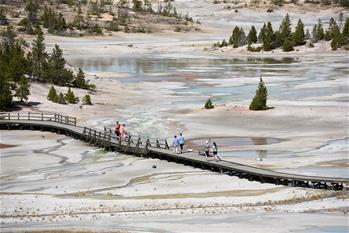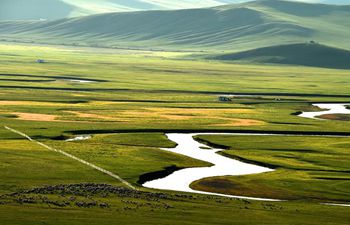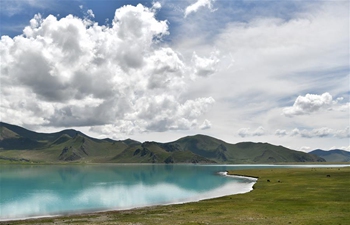XI'AN, Sept. 7 (Xinhua) -- In northwestern Chinese county of Wuqi, there is a saying about the free-range goats with "mouths like shears and hooves like shovels," nibbling away the grassroots and peeling the tree bark.
Leaning on the door of his corner store, Yan Zhihong looked into the distance at the lush mountains and nearby reservoir. Memories of the old days took the 55-year-old back 20 years to when he used to herd goats up the barren hills.
Yan lives in a small village in Wuqi of Yan'an in the northwestern Shaanxi Province, a sacred revolutionary base of the Communist Party of China in the 1940s.
In 1997, the local government of Wuqi identified goat breeding as a pillar industry, while experts came from the Food and Agriculture Organization of the United Nations chilled the enthusiasm by saying that the area was too fragile to graze.
Located in the arid and semi-arid gully area of the Loess Plateau, Yan'an has long suffered severe water loss and soil erosion.
Poor soil made life tougher for local farmers like Yan whose harvests largely depended on the whims of nature. They had to keep clearing the land just to make a living and were then caught in a vicious circle of more reclamation, more wasteland and fewer gains.
"There was barely a touch of green on the bald, overgrazed and overfarmed hills," Yan said.
The earliest change appeared in Wuqi, north of Yan'an with the worst natural conditions.
Grazing on the hills was prohibited starting from 1998 in Wuqi, the first area in the country to do so, with all goats required to be reared in pens. Nationwide eco-construction engineering which centered on returning farmland to forest and grassland kicked off one year later.
Yan was raising some 80 goats and was reluctant to sell them as encouraged when reforestation was launched in Yan'an.
Thanks to grain and cash subsidies, Yan and his fellows in Wuqi were no longer tied to their land, and they started to bravely devote themselves in a "green revolution."
Yet growing trees on the dry and rainless loesses of northern Shaanxi was no easy task. To create an area of artificially planted forest, the plot would have to be replanted five or six times every June to September when there was some rainfall.
Twenty years of unremitting efforts of reforestation has coated Yan'an with more than 700,000 hectares of forests, raising the city's vegetation coverage from 46 percent in 2000 to 81.3 percent in 2018.
Lucid waters and lush mountains have given local farmers new opportunities to live a better life, as cash crops such as apples, muskmelons, peppers, walnuts and other harvests have bulged people's wallets. Yan'an's rural per capita disposable income increased to 10,786 yuan in 2018, an almost eightfold rise from 20 years ago.
Tourism thrives in Yan's village, with a resort that has cave dwelling-themed guesthouses, yachts and flower fields.
"Now, I can make more than 30,000 yuan a year by running my store," Yan said.

















